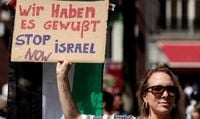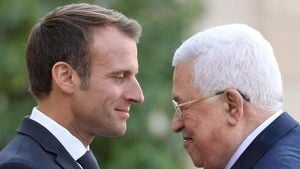The Netherlands is reeling from a deepening political crisis after the dramatic resignation of Foreign Minister Caspar Veldkamp, a move that has thrown the country’s already fragile caretaker government into further disarray. Veldkamp, a seasoned diplomat and former ambassador to Israel, stepped down on August 22, 2025, following a contentious cabinet meeting that failed to produce consensus on imposing new sanctions against Israel in response to its ongoing war in Gaza and controversial plans for settlement expansion in the occupied West Bank.
According to Reuters, Veldkamp told reporters he “felt pushback in the cabinet for additional measures,” and made clear he could no longer serve effectively under such constraints. “I have felt pushback in the cabinet for additional measures,” he said, confirming that he would formally tender his resignation. He later told Dutch news agency ANP that he was “insufficiently able to take meaningful additional measures.” In his resignation statement, Veldkamp emphasized, “We are living in a time of unprecedented geopolitical tension, where diplomacy matters more than ever.”
The immediate fallout was swift and severe. The New Social Contract (NSC) party, to which Veldkamp belongs, withdrew from the governing coalition in solidarity, further weakening the minority caretaker administration. The Netherlands has been under this provisional government since June 3, 2025, when the previous coalition collapsed after the far-right Party for Freedom (PVV) withdrew its ministers, prompting early elections now scheduled for October 29. With coalition talks expected to drag on for months, the country faces a prolonged period of political uncertainty.
This latest crisis was triggered by mounting tensions over Israel’s military campaign in Gaza and its recent approval of a massive new settlement project in the West Bank. Earlier in August, Israel gave the green light to construct more than 3,400 homes in a settlement that critics say would effectively bisect the West Bank, undermining prospects for a contiguous Palestinian state. The Netherlands, aligning with 20 other countries, signed a joint declaration on August 21 condemning the Israeli settlement project as “unacceptable and contrary to international law.”
The Dutch government’s stance on Israel has hardened in recent months. In July, the Netherlands took the unusual step of declaring far-right Israeli ministers Itamar Ben Gvir and Bezalel Smotrich persona non grata, barring them from entering the country. This move came amid growing concerns over Israeli actions in the occupied territories and a surge of disinformation campaigns that, according to Amsterdam officials, have posed a direct threat to Dutch national security for the first time.
Yet, despite these measures, Veldkamp and his NSC colleagues felt that the government was not going far enough. The cabinet deadlocked over additional steps, with the centrist NSC accusing its coalition partners—the center-right People’s Party for Freedom and Democracy (VVD) and the populist Farmer-Citizen Movement (BBB)—of refusing to acknowledge what they described as the “alarming situation in Gaza” and failing to take necessary action. “Our coalition partners refuse to acknowledge the alarming situation [in Gaza] and take necessary action,” the NSC stated after the cabinet impasse.
The sense of urgency was heightened by a series of massive public demonstrations. Between June and August 2025, The Hague witnessed its largest protests in two decades, drawing between 100,000 and 150,000 people demanding sanctions on Israel and humanitarian access for Gaza’s civilians. The protests reflected widespread frustration with the government’s perceived inaction as the conflict in Gaza neared its two-year mark.
The humanitarian crisis in Gaza reached a new low on August 22, when United Nations-backed experts officially declared a famine in Gaza City and surrounding areas. The Integrated Food Security Phase Classification (IPC), which has only declared four famines since its inception in 2004, described the situation as “entirely man-made” and warned that deaths could rise exponentially if aid continued to be blocked. The United Nations blamed “systematic obstruction” of humanitarian aid by Israel for the dire conditions. Israel, for its part, has dismissed the findings as “false and biased.”
Israel’s ongoing military offensive in Gaza, which aims to seize control of Gaza City, relocate civilians to the south, dismantle Hamas, and pressure for the release of hostages, has drawn sharp criticism from international observers. The Dutch government, already under pressure from both domestic protesters and international partners, has found itself increasingly isolated. Within the European Union, efforts to forge a unified stance have repeatedly faltered. EU foreign ministers have failed to agree on collective sanctions against Israel, despite lobbying from several member states, including the Netherlands.
Veldkamp’s resignation has exposed deep fissures within Dutch politics about how best to respond to the crisis. While some parties, like the NSC, have pushed for a tougher line against Israel, others remain wary of jeopardizing diplomatic ties or taking measures that could have broader geopolitical ramifications. The VVD and BBB, for instance, have argued for caution, emphasizing the complexities of the region and the risks of unilateral action.
The political turbulence in the Netherlands is emblematic of wider divisions across Europe. As reported by The Guardian, the Dutch caretaker government’s inability to reach consensus mirrors broader EU paralysis, with member states split over how to balance support for Israel’s security concerns against mounting evidence of humanitarian catastrophe in Gaza. Meanwhile, public sentiment in the Netherlands and elsewhere appears to be shifting, with growing numbers demanding accountability and action in the face of ongoing suffering.
Looking ahead, the Netherlands faces a period of uncertainty. The caretaker government, now even more diminished, will continue in a limited capacity until a new coalition can be formed after the October elections—a process that could take months given the fractured political landscape. In the meantime, the Dutch response to the Gaza crisis remains in flux, shaped by competing pressures from within the cabinet, the public, and the international community.
As the humanitarian toll in Gaza mounts and the political crisis in The Hague deepens, the Netherlands finds itself at a crossroads, grappling with how to balance diplomatic principles, domestic pressures, and the urgent demands of a conflict that shows no sign of resolution.





